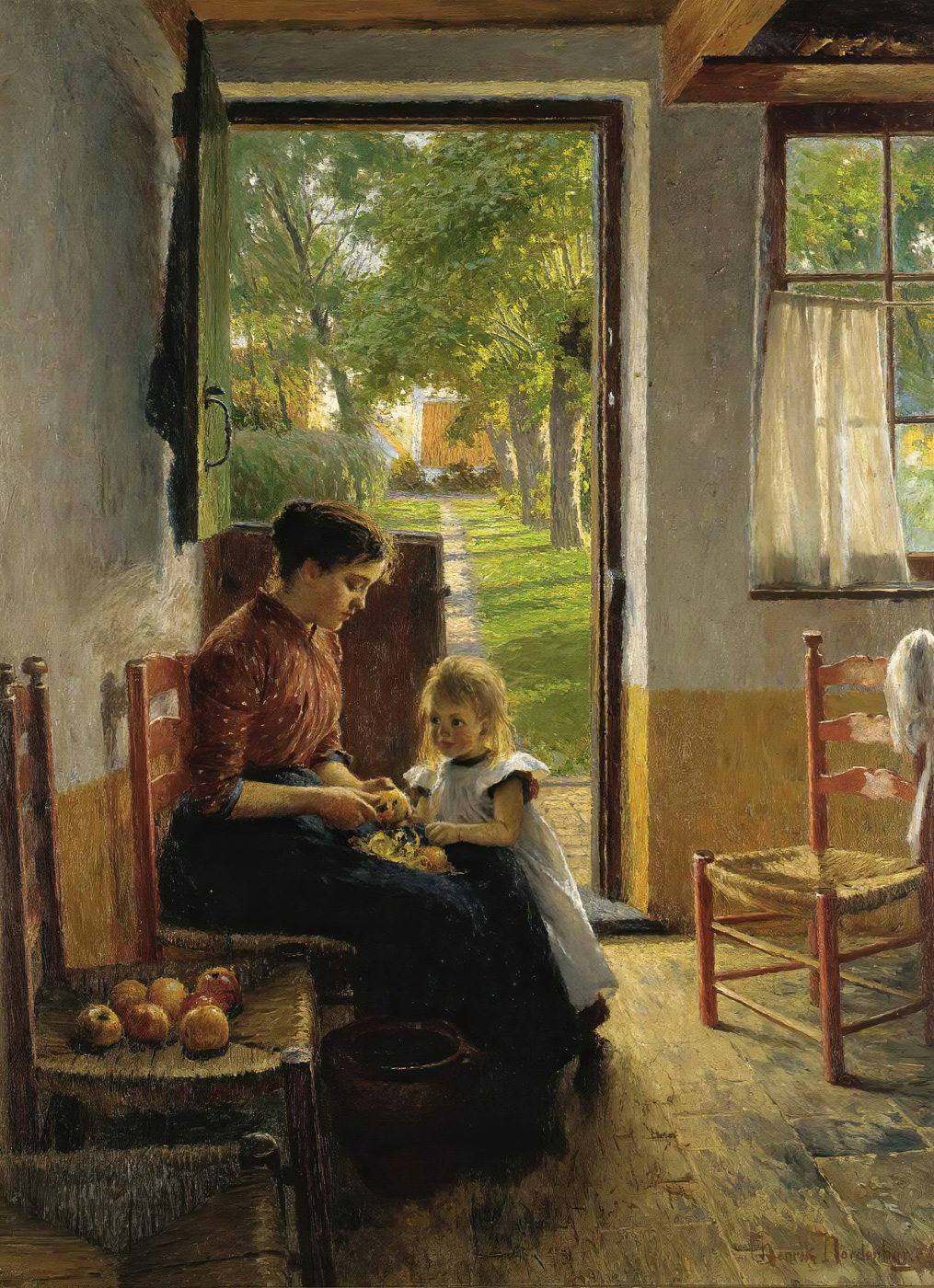
Strength
To Stay

Mrs. Carla Galdo
Premium Subscribers
Sorry, this feature is only available for H&F Print Premium subscribers. You can sign up here.
(If you are already a Print Premium subscriber, be sure to click the authentication link you were sent by email so this won't happen again.)
The other evening, after I dutifully set the electric pressure cooker to make a pot of beef stew, I popped out of the house for a quick jog in the waning light. Along the road, I chatted over the phone with a friend, and our talk turned to the trials and challenges of home life. “Oh yeah,” he said, “give me the stigmata, or a hair shirt, or a glorious and painful martyrdom! I’d be really great at all that! But,” he reflected, “what really gets me are the little, tiny trials of marriage, children, and family life. I’m not so good at those.” While I am not so sure I have the same brash certainty as my friend about my ability to embrace mystical suffering or sudden martyrdom, I do know that the everyday trials of family life are also my greatest challenges. They are the sparks that can either flame into virtue or kindle sudden blazes of vice.
Granted, there was a time when I thought myself quite good at being faithful and committed to everyday things. This was in my school days and my early adulthood, before I had children. To begin with, I was a good student. I did assignments in full and on time, and was rewarded with good grades and the approval of my teachers. In addition, I showed up to my clubs, sports, and extracurriculars, tried my hardest, and did well enough. When I began working, I found myself very good at meeting deadlines. It was all smooth and straightforward for me, and not particularly challenging. I put in the effort and reaped the reward, much as though I were putting coins in a vending machine and then enjoying a treat as a result.
Then I became a mother, and things changed. The blinders of childhood obliviousness can remain set for many years, but eventually I had to realize that my commitment to accomplishment in the academic realm, though good in many ways, was mainly easy for me because it was clear-cut and self-serving. It had not formed me for very many of the more personally challenging things that I would have to face as a homemaker, wife, and mother. My life in this context was going to require work of an entirely different kind, a kind that was neither easy nor about myself. As one of two parents in a growing household, I was not going to be able to get out of latrine-cleaning duty as I had somehow managed to do during Girl Scout camp, nor was I going to be able to continue to neglect the laundry until it piled up to eye-level. It turns out that in all my years of success as a student and later as a writer, I hadn’t learned very much about real strength or faithfulness at all.
 As I gradually came to accept this truth, I also realized I would need to begin taking household management more seriously. Now knowing that faithfulness in the little tasks of family life, not in meeting academic deadlines, was going to be my greatest challenge, I had to face the fact that ungraded, hidden tasks such as laundry, bathrooms, and other such chores demanded execution with humility and sacrificial integrity. They never brought the affirmation of a check from an editor or a grade from a teacher. I still found these chores quite unpleasant, however, and I still often managed to avoid them for as long as possible. Although I wasn’t actually going anywhere — except perhaps to hidden corners of the house to read or type — I found myself repeatedly running away from the work at hand when it didn’t appeal to me. I had not yet found the strength to stay in the little, uncomfortable places — to do the task at hand well and without applause.
As I gradually came to accept this truth, I also realized I would need to begin taking household management more seriously. Now knowing that faithfulness in the little tasks of family life, not in meeting academic deadlines, was going to be my greatest challenge, I had to face the fact that ungraded, hidden tasks such as laundry, bathrooms, and other such chores demanded execution with humility and sacrificial integrity. They never brought the affirmation of a check from an editor or a grade from a teacher. I still found these chores quite unpleasant, however, and I still often managed to avoid them for as long as possible. Although I wasn’t actually going anywhere — except perhaps to hidden corners of the house to read or type — I found myself repeatedly running away from the work at hand when it didn’t appeal to me. I had not yet found the strength to stay in the little, uncomfortable places — to do the task at hand well and without applause.
Yet, as I have grown in experience over the years, my conviction that this is the truest sort of strength has only grown. As I found myself saying to one of my teenage children the other day, “It’s not being strong to run away from the things you don’t feel like doing. Actually, it takes more strength to stay, to do what you’re supposed to do — especially if it’s small and insignificant, especially if you can think of a million other things you’d rather be doing.”
Fidelity to the daily, sacrificial labor of doing household chores is not glorious and is often unnoticed. This was the problem for me, but within the problem lies the point. Hidden work is valuable work, which interlaces our lives with the lives of those closest to us, whether it be in our home or our neighborhood. Jesus himself spent thirty hidden years of inglorious fidelity to the work of his home and shop, and while he was not yet known to the wider world, his family knew him, as did his local community (as we so starkly see in the Nazarenes’ negative response to his ministry). The hidden work of fetching water for his mother or, perhaps, mending a child’s wooden toy was work that was interlaced with the lives of the people around him. There were probably many cousins who knew his kindness and his reliability when someone was in need. Very likely, more than one neighborhood child was the beneficiary of his kindness and his wisdom. The moment when he instructed his disciples to “let the little children come to me” was surely not the first time he held a child in his arms, on his lap, or in his attention.

The moment when he instructed his disciples to “let the little children come to me” was surely not the first time he held a child in his arms, on his lap, or in his attention.

Caring for my children, while full of luminous moments, was a hard training for me in this kind of work. In many ways it feels like a descent into a confusing realm of busyness so intense, so filled with both household and human needs, that I can hardly get my bearings on most days. Family life feels a bit like one of those now-outlawed merry-go-rounds on the playgrounds of my childhood: it spins so fast that no matter how hard I try to stay in place, my strength isn’t enough, and the sheer force of life’s spin threatens to fling me off the edge. Soon enough, I find myself thrown onto the metaphorical sand surrounding the merry-go-round — or, as the case may be, onto the Lego-covered bedroom floors and the errant piles of clean-but-as-yet unfolded laundry lingering on the sofa.
Yet in the midst of our family’s constant whirl of life, small family tasks such as baking bread, putting a closet in order, brushing a child’s hair, holding a book from which to read-aloud, or settling a child into bed also increasingly help ground me in place, both physically and metaphorically.  As I carry out these small, tangible tasks, my strength to stay builds, as I am reminded that here, in the very most local, most specific of all spaces, I am doing even more fitting work than I do when I am writing, because in these tasks I am serving the people, the place, and the needs nearest to me. While my writing is important, it can never be the center of my activity or of my life, because both my motherhood and my beliefs make me at heart a localist, and my family and home are the ultimate locales of my life. Whatever the challenges of life, facing them is almost always better than hiding in a corner with a laptop, where the muscles needed for daily life have little chance to grow.
As I carry out these small, tangible tasks, my strength to stay builds, as I am reminded that here, in the very most local, most specific of all spaces, I am doing even more fitting work than I do when I am writing, because in these tasks I am serving the people, the place, and the needs nearest to me. While my writing is important, it can never be the center of my activity or of my life, because both my motherhood and my beliefs make me at heart a localist, and my family and home are the ultimate locales of my life. Whatever the challenges of life, facing them is almost always better than hiding in a corner with a laptop, where the muscles needed for daily life have little chance to grow.
And so I continue daily to try to find the strength to sit in this truer space, the space of chores and of serving others, where I am challenged to be faithful in ways that are less visible, less intuitive, and less easy than in any other part of my life. In short, I’m more likely to know I’m being faithful when my hands are set to something tangible, even something as relentless as cooking daily meals for eight people, than when I’m glued to a glowing screen. My heart might sometimes be half-present in the midst of my tasks, but my hands pull me toward where my attention ought to be.
In the midst of challenges — my own, or those through which I accompany my spouse or my children — I try to remember that I am blessed by a peaceful place to live, a wonderful family, and the resources to take care of our daily needs. There are many in the world, as I write this, who cannot say the same, and who suffer much more deeply than I do. Nonetheless, those moments when my weaknesses hover close to the surface remain, and as the years go by, my ability to fool myself into thinking that I know what I’m doing is constantly decreasing.
 I might not yet be at the point where I can instinctively delight in this weakness, but I can delight in my daughter’s dancing, my son’s squeezing hugs, my husband’s forgiveness. And fortunately, as scripture reminds us, there is another strength that I can call upon when I start to feel my grip on the merry-go-round’s handlebars beginning to slip. When I remember how the Lord told Saint Paul “my grace is sufficient for you . . . my power is made perfect in weakness,” I can set myself and my journey firmly in the hands of Christ, and take the next necessary step to be faithful.
I might not yet be at the point where I can instinctively delight in this weakness, but I can delight in my daughter’s dancing, my son’s squeezing hugs, my husband’s forgiveness. And fortunately, as scripture reminds us, there is another strength that I can call upon when I start to feel my grip on the merry-go-round’s handlebars beginning to slip. When I remember how the Lord told Saint Paul “my grace is sufficient for you . . . my power is made perfect in weakness,” I can set myself and my journey firmly in the hands of Christ, and take the next necessary step to be faithful.
I hope that when my children become parents, they will be able to look back on their childhoods and say truthfully that, even despite their parents’ failings, Mom and Dad consistently modeled the strength to stay. I hope they’ll remember their mother’s daily endeavors to cook, homeschool, and drive kids to activities, even when she might rather have been reading a book or tapping away at a laptop. I hope they’ll think of their father’s commitment to earning a living for our family, staying at work out of love for them even when he longed to be at home playing the piano or out on the road training for a cycling race. And I hope that we can continue as a family to endeavor to be faithful, to stick around and simply show up for the next thing — even if it’s small, even if it feels insignificant, even if we’re sometimes not good at it, and even if there are a million other things one of us would rather be doing. (And even if we have to do it all without the benefit of a hair shirt or the stigmata.)
That, I tell my children, is real strength.



